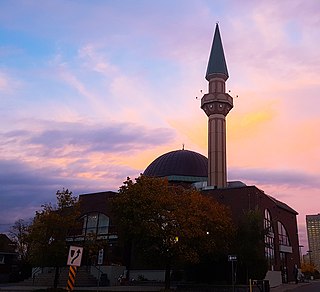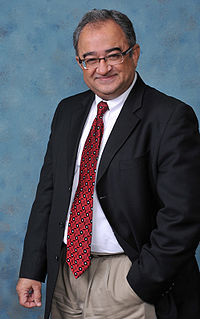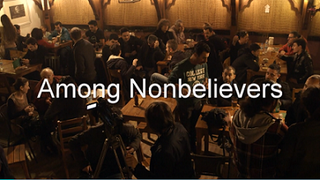Sharia is a body of religious law that forms part of the Islamic tradition. It is derived from the religious precepts of Islam and is based on the sacred scriptures of Islam, particularly the Quran and the Hadith. In Arabic, the term sharīʿah refers to God's immutable divine law and is contrasted with fiqh, which refers to its human scholarly interpretations. The manner of its application in modern times has been a subject of dispute between Muslims and Secularists.
Islamophobia is the fear of, hatred of, or prejudice against the religion of Islam or Muslims in general, especially when seen as a geopolitical force or a source of terrorism.
Islamic fundamentalism has been defined as a puritanical, revivalist, and reform movement of Muslims who aim to return to the founding scriptures of Islam. Islamic fundamentalists are of the view that Muslim-majority countries should return to the fundamentals of an Islamic state that truly shows the essence of the system of Islam, in terms of its socio-politico-economic system. Islamic fundamentalists favor a literal and originalist interpretation of the primary sources of Islam, seek to eliminate corrupting non-Islamic influences from every part of their lives, and see "Islamic fundamentalism" as a pejorative term used by outsiders for Islamic revivalism and Islamic activism.

Islam is the second largest religion in Canada. Muslims have lived in Canada since 1871 and the first mosque was established in 1938. Most Canadian Muslims are Sunni, while a significant minority are Shia and Ahmadiyya. There are a number of Islamic organizations and seminaries (madrasas). Opinion polls show most Muslims feel "very proud" to be Canadians, and attend mosque at least once a week.

Islam is now the second largest religion in the United Kingdom of Great Britain and Northern Ireland, with results from the United Kingdom 2011 Census giving the UK Muslim population in 2011 as 2,516,000, 4.4% of the total population, while more recent Office of National Statistics sources have it in 2018 as 3,372,966 in Great Britain alone. The vast majority of Muslims in the United Kingdom live in England: 2,660,116. 76,737 Muslims live in Scotland (1.45%), 45,950 in Wales (1.50%). London has the greatest population of Muslims in the country. The vast majority of Muslims in United Kingdom adhere to Sunni Islam, while smaller numbers are associated with Shia Islam.

Pascal Bruckner is a French writer, one of the "New Philosophers" who came to prominence in the 1970s and 1980s. Much of his work has been devoted to critiques of French society and culture.
Criticism of Islam is broadly defined as criticism of the Islamic religion in its beliefs, principles, and/or any other ideas attributed to Islam.

Islam Channel is a UK-based, free-to-air, English language, Islamic-focused satellite television channel funded by advertising and donations. It was founded in 2004 by Mohamed Ali Harrath, a Tunisian activist and businessman who is also its chief executive officer. It was reported in 2008 that UK government research found that 59% of British Muslims watched the channel. It broadcasts across Europe, the Middle East and Africa, is streamed live on the internet and is soon to commence broadcasting in North America. Islam Channel began broadcasting in March 2004 on Sky Digital channel 836, but subsequently moved to channel 813, then 806, now 737. In April 2010, it launched on Freesat channel 693.

Tarek Fatah is a Pakistani-Canadian journalist and author. Fatah advocates LGBT rights, a separation of religion and state, opposition to sharia law, and advocacy for a "liberal, progressive form" of Islam. He calls himself "an Indian born in Pakistan" and "a Punjabi born into Islam" and is a vocal critic of the Pakistani religious and political establishment. To this end, Fatah has criticized the partition of India.
There is a wide range of Muslim attitudes towards terrorism.

Caroline Anne Cox, Baroness Cox, FRCN is a cross-bench member of the British House of Lords. She is also the founder of an organisation called Humanitarian Aid Relief Trust (HART). Cox was created a Life Peer in 1982 and was a deputy speaker of the House of Lords from 1985 to 2005, as well as being a minister in government. She was also a Baroness-in-Waiting to Queen Elizabeth II. She was Founder Chancellor of Bournemouth University, Chancellor of Liverpool Hope University from 2006-2013, and is an Hon. Vice President of the Royal College of Nursing. She was a founder Trustee of MERLIN Medical Emergency Relief International.

Maryam Namazie is a British-Iranian secularist, communist and human rights activist, commentator, and broadcaster.

The British debate over veils began in October 2006 when the MP and government minister Jack Straw wrote in his local newspaper, the Lancashire Evening Telegraph, that, while he did not want to be "prescriptive", he preferred talking to women who did not wear a niqab as he could see their face, and asked women who were wearing such items to remove them when they spoke to him, making clear that they could decline his request and that a female member of staff was in the room.
Criticism of multiculturalism questions the ideal of the maintenance of distinct ethnic cultures within a country. Multiculturalism is a particular subject of debate in certain European nations that are associated with the idea of a nation state. Critics of multiculturalism may argue against cultural integration of different ethnic and cultural groups to the existing laws and values of the country. Alternatively critics may argue for assimilation of different ethnic and cultural groups to a single national identity.
Multiculturalism in the Netherlands began with major increases in immigration during the 1950s and 1960s. As a consequence, an official national policy of multiculturalism was adopted in the early 1980s. This policy subsequently gave way to more assimilationist policies in the 1990s and post-electoral surveys uniformly showed from 1994 onwards that a majority preferred that immigrants assimilated rather than retained the culture of their country of origin. Even though the general acceptance of immigrants increased, opinion polls from the early 1980s and after showed that many were critical of immigration. Following the murders of Pim Fortuyn and Theo van Gogh the political debate on the role of multiculturalism in the Netherlands reached new heights.
A ban on sharia law is legislation that prohibits the application or implementation of Islamic law (Sharia) in courts in any civil (non-religious) jurisdiction. In the United States, various states have "banned Sharia law," or passed some kind of ballot measure that "prohibits the state’s courts from considering foreign, international or religious law." As of 2014 these include Alabama, Arizona, Kansas, Louisiana, North Carolina, South Dakota and Tennessee. In the Canadian province of Ontario, family law disputes are arbitrated only under Ontario law.

Paul Bernard Cliteur is a Dutch professor of jurisprudence at Leiden University, as well as a politician, philosopher, writer, publicist and columnist. He is known for his conservative perspective, his atheism, republicanism and efforts for animal rights. He is a member of De Vrije Gedachte. Since 2015, Cliteur is a member of the Dutch political party Forum voor Democratie, where he is chairman of the advisory board and the party's official think tank. In 2019 he was elected to be parliamentary group leader for Forum voor Democratie in the Dutch Senate.
Islamo-leftism, adjectivally Islamo-leftist, is a neologism applied to the alleged political alliance between leftists and Islamists.
Several notable opinion polls have been undertaken on Islam and related topics, including fundamentalism, and Islamic terrorism. Polls have interviewed both Muslim respondents and other groups.

Among Nonbelievers is a 2015 bilingual English–Dutch documentary on the situation of endangered nonbelievers, especially ex-Muslims, around the world. Set in the United Kingdom, Turkey, the Netherlands and Switzerland, the film is directed by Dorothée Forma and produced by HUMAN with the support of the Dutch Humanist Association. In 2016, it was succeeded by Non-believers: Freethinkers on the Run, which dealt with the fate of apostates and freethinkers in Dutch refugee camps.









